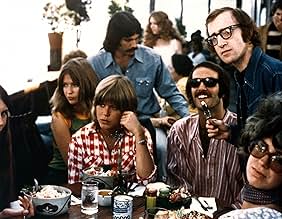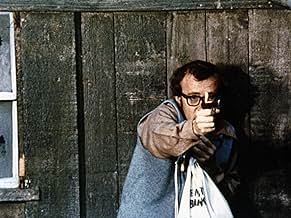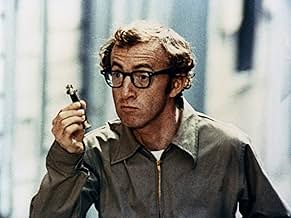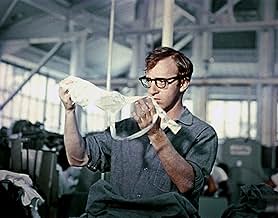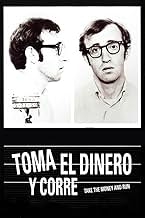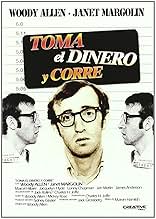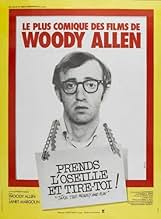IMDb रेटिंग
7.2/10
32 हज़ार
आपकी रेटिंग
अपनी भाषा में प्लॉट जोड़ेंThe life and times of inept bank robber Virgil Starkwell.The life and times of inept bank robber Virgil Starkwell.The life and times of inept bank robber Virgil Starkwell.
- पुरस्कार
- 3 कुल नामांकन
Dan Frazer
- Julius Epstein - The Psychiatrist
- (as Don Frazier)
Jackson Beck
- The Narrator
- (वॉइस)
फ़ीचर्ड समीक्षाएं
TAKE THE MONEY AND RUN is Mel Brooks-like in structure and gags, but definitely Woody Allen at his comical best. Its not his greatest picture by any means, but perhaps the best of his early slapstick flicks (SLEEPER, BANANAS). "Virgil Starkwell" has a hard time stealing right from the start. When a criminal gets a gumball machine "stuck to his hand", you know he's in the wrong gig. Woody Allen is right at home with this innocent, documentary-style drip on the unintentional hilarity of 60's crime documentaries. Woody, or "Virgil", seems to be playing Woody as usual, something we all know runs through his entire body of work. This movie is very much like his innovative ZELIG of 1983, a black and white docu-spoof about a fictional chameleon.
Jackson Beck's narration is PERFECT in making the outrageous material seem "serious". It no doubt inspired the short spoofs "Saturday Night Live" would go on to produce for years, investigative reporting seemingly important, yet ridiculous in content. "Virgil's" parents are in disguise (Groucho Marx nose and glasses) whenever they are "interviewed". The chain gang escape is one of the funniest sequences I have ever seen. Woody also moves into romantic territory with the beautiful Janet Margolin, who had a nice, fat purse for "Virgil" to steal, but also has a quick reaction to his inept robbery attempt and, of course, they fall in love. She is there for "Virgil" to live for during his always brief prison stays and to pick out his clothes for a robbery. There are some familiar elements here, most obviously the beautiful young girl falling for a middle-aged homely Woody.
TAKE THE MONEY AND RUN is all about raw comedic filmmaking and mockery. It is not a situational film at all, just a bunch of perfectly cohesive episodes of this perfectly moronic bank robber, who spells gun G-U-B. Wouldn't that throw us all off if we were the bank tellers taking a note during a stick up ?
Jackson Beck's narration is PERFECT in making the outrageous material seem "serious". It no doubt inspired the short spoofs "Saturday Night Live" would go on to produce for years, investigative reporting seemingly important, yet ridiculous in content. "Virgil's" parents are in disguise (Groucho Marx nose and glasses) whenever they are "interviewed". The chain gang escape is one of the funniest sequences I have ever seen. Woody also moves into romantic territory with the beautiful Janet Margolin, who had a nice, fat purse for "Virgil" to steal, but also has a quick reaction to his inept robbery attempt and, of course, they fall in love. She is there for "Virgil" to live for during his always brief prison stays and to pick out his clothes for a robbery. There are some familiar elements here, most obviously the beautiful young girl falling for a middle-aged homely Woody.
TAKE THE MONEY AND RUN is all about raw comedic filmmaking and mockery. It is not a situational film at all, just a bunch of perfectly cohesive episodes of this perfectly moronic bank robber, who spells gun G-U-B. Wouldn't that throw us all off if we were the bank tellers taking a note during a stick up ?
Take the Money and Run (1969) was Woody Allen's motion picture debut (sans 'Tiger Lily). The film follows the life of a criminal loser, shot in a faux documentary style. Allen used the most out of his small budget and made an amusing film. This was the beginning of his slapstick/farce phase that would last until the early 70's. An interesting start for one of America's most unique film-makers of that era. The script by Mickey Rose and Woody Allen is deeply engraved with screwball humor from their childhood icons such as the Marx Brothers and Charles Chaplin. This film showed the promise of a brilliant director who would become a major player in Hollywood in the years to come. Highly recommended.
A.
A.
Very early Woody Allen winner has the all-time lovable loser trying to make ends meet with girlfriend and future wife Janet Margolin. Allen, obviously pretty unskilled in most everything, decides that he can do just what the title of the film says and achieve true happiness with his one true love. Documentary-styled footage makes the picture unfold in a quietly uproarious way as Allen uses corny techniques used by most news organizations to tell a story that would have looked very odd without his insight being involved. Allen's films only work because he makes them work usually and that is definitely the case with "Take the Money and Run". Once again he shows unlimited potential and would use this movie, more than any other, as a spring-board for much future success in the 1970s, 1980s and beyond. 4 stars out of 5.
"Take the Money and Run" is an absolutely hilarious Woody Allen film, done in a quasi-documentary style, about a career criminal, Virgil Starkwell, who has a very unsuccessful career. His prison breaks don't go as planned, his robberies are a disaster and usually coincide with someone else's robbery of the same place, and his planning of a job would be fine if only he weren't talking to an associate in a restaurant while the police are in the booth behind him. One nice perk of failure: while attempting to rob a young woman's purse, he falls in love with her (Janet Margolin). Virgil does admit at one point thinking of foregoing robbery and taking up a career in singing. He doesn't mention the cello, which gave him his start in music - and crime.
This is one of those laugh out loud even when you're alone movies of which there are all too few. But this is one. Over a tough, FBI-type narration, we watch Virgil's futile attempts at making money through crime, see his parents (disguised) interviewed, as well as his wife and the various police and investigators he meets along the way.
It's amazing to look at this film and then look at "Match Point" done 35 years later and see the evolution of this brilliant man. Woody Allen is capable of rock-solid comedy as well as provocative movie-making. Although he's had a few blips along the way, one wonders what he'll think of next.
This is one of those laugh out loud even when you're alone movies of which there are all too few. But this is one. Over a tough, FBI-type narration, we watch Virgil's futile attempts at making money through crime, see his parents (disguised) interviewed, as well as his wife and the various police and investigators he meets along the way.
It's amazing to look at this film and then look at "Match Point" done 35 years later and see the evolution of this brilliant man. Woody Allen is capable of rock-solid comedy as well as provocative movie-making. Although he's had a few blips along the way, one wonders what he'll think of next.
Now I'm rarely a man to agree with any 'consensus view' of particular films, yet I very much have to go along with the tide as regards 'Take the Money and Run' - only the second Allen film I have commented upon here, though I have seen many more.
Basically, the film is enjoyable viewing throughout, but not an entirely consistent, successful comedy. Allen had yet to hone his skills in fashioning feature length films; I have reservations more so for 'Bananas', less so for 'Sleeper' and 'Love and Death'; the two films with which he really hits his stride. This is his first film as a director and thus maybe it is to be expected that we'll see a transitional film. One can tell Allen is trying to work out a formula to translate his largely verbal stand-up humour to film. He really does a pretty good job of this. There are plenty of very good jokes and a generally very lightweight, genial tone to this picture. It is seen through by this, yet is hamstrung by its very effervescence; the film is likeable and won me over, yet it is too scattershot in approach and delivery to really satisfy.
Woody himself is an instantly winning figure in his comic persona; that of a physically diminutive and verbally bumbling Jewish intellectual. With in this film the vocation of a bank robber; a displacement which results in much of the expected amusement. There's not yet any attempt to go very deep into this character of his, but this is a pure, light comedy. No real New York or indeed Bergman or Chekhov reference points yet.
One is reminded in Allen of David Thomson's insightful comments on Chaplin and the persona he projected to audiences; trying to charm them and win them over by a certain vulnerability and status as 'underdog'. It is very true that in many of Allen's films, like Chaplin, he is right at the centre of the film, and the world outside is not portrayed with any sense of the mechanics of reality. Conflicts are never all that serious or convincing; he draws from a limited pool of character types, in socio-political terms. Allen has done films with other leads; though his usual concerns always find their way through. 'Take the Money and Run' is full of the Chaplin tendency to have bullish, physically imposing figures, or indeed perhaps a wider society, threatening the 'little man'. There is a wish-fulfilment woman in the languid person of Janet Margolin's Louise; as a character more a projection than of flesh and blood or shades of grey. She works well as a slightly wan, attractive comic foil for Allen, who doesn't mind getting her hands dirty, but she's really not Diane Keaton.
This film is slight, no question about that... it fails under real scrutiny, yet it is largely very enticing stuff; an early glimpse of Allen getting his filmic technique in order. If you like what the man does - and surely most (wryly bespectacled) film cineastes such as I do! - then you are sure to enjoy this film. Just don't count on it being a triumph in the major key.
Rating:- *** 1/2/*****
Basically, the film is enjoyable viewing throughout, but not an entirely consistent, successful comedy. Allen had yet to hone his skills in fashioning feature length films; I have reservations more so for 'Bananas', less so for 'Sleeper' and 'Love and Death'; the two films with which he really hits his stride. This is his first film as a director and thus maybe it is to be expected that we'll see a transitional film. One can tell Allen is trying to work out a formula to translate his largely verbal stand-up humour to film. He really does a pretty good job of this. There are plenty of very good jokes and a generally very lightweight, genial tone to this picture. It is seen through by this, yet is hamstrung by its very effervescence; the film is likeable and won me over, yet it is too scattershot in approach and delivery to really satisfy.
Woody himself is an instantly winning figure in his comic persona; that of a physically diminutive and verbally bumbling Jewish intellectual. With in this film the vocation of a bank robber; a displacement which results in much of the expected amusement. There's not yet any attempt to go very deep into this character of his, but this is a pure, light comedy. No real New York or indeed Bergman or Chekhov reference points yet.
One is reminded in Allen of David Thomson's insightful comments on Chaplin and the persona he projected to audiences; trying to charm them and win them over by a certain vulnerability and status as 'underdog'. It is very true that in many of Allen's films, like Chaplin, he is right at the centre of the film, and the world outside is not portrayed with any sense of the mechanics of reality. Conflicts are never all that serious or convincing; he draws from a limited pool of character types, in socio-political terms. Allen has done films with other leads; though his usual concerns always find their way through. 'Take the Money and Run' is full of the Chaplin tendency to have bullish, physically imposing figures, or indeed perhaps a wider society, threatening the 'little man'. There is a wish-fulfilment woman in the languid person of Janet Margolin's Louise; as a character more a projection than of flesh and blood or shades of grey. She works well as a slightly wan, attractive comic foil for Allen, who doesn't mind getting her hands dirty, but she's really not Diane Keaton.
This film is slight, no question about that... it fails under real scrutiny, yet it is largely very enticing stuff; an early glimpse of Allen getting his filmic technique in order. If you like what the man does - and surely most (wryly bespectacled) film cineastes such as I do! - then you are sure to enjoy this film. Just don't count on it being a triumph in the major key.
Rating:- *** 1/2/*****
क्या आपको पता है
- ट्रिवियाThe first widely-released "mockumentary".
- गूफ़As the chain gang escapes, they climb the same embankment twice.
- कनेक्शनFeatured in The Dick Cavett Show: Woody Allen (1971)
टॉप पसंद
रेटिंग देने के लिए साइन-इन करें और वैयक्तिकृत सुझावों के लिए वॉचलिस्ट करें
- How long is Take the Money and Run?Alexa द्वारा संचालित
विवरण
- रिलीज़ की तारीख़
- कंट्री ऑफ़ ओरिजिन
- भाषाएं
- इस रूप में भी जाना जाता है
- Woody, der Unglücksrabe
- फ़िल्माने की जगहें
- उत्पादन कंपनियां
- IMDbPro पर और कंपनी क्रेडिट देखें
बॉक्स ऑफ़िस
- बजट
- $15,00,000(अनुमानित)
- चलने की अवधि
- 1 घं 25 मि(85 min)
- ध्वनि मिश्रण
- पक्ष अनुपात
- 1.85 : 1
इस पेज में योगदान दें
किसी बदलाव का सुझाव दें या अनुपलब्ध कॉन्टेंट जोड़ें



